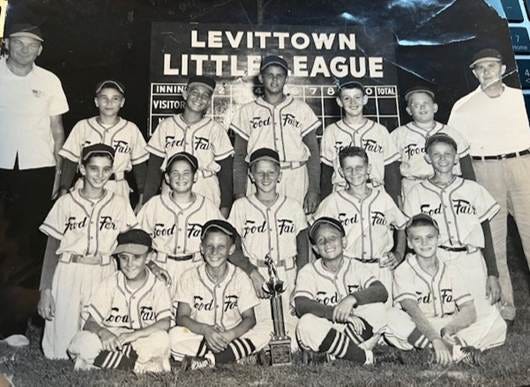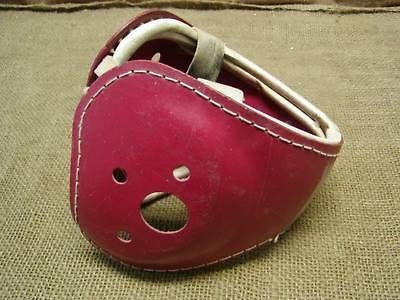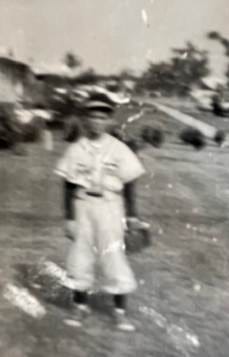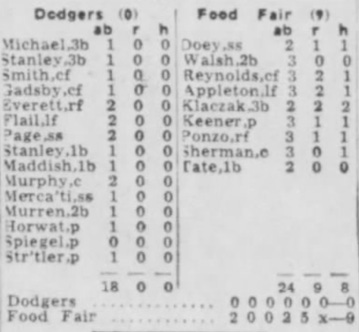Making the Team
At nine, I made my first Little League team. Our first game was one for the record books.
The ball skidded across the dirt of the skinned infield toward me. I bent my knees, lowered my butt, and positioned my glove on the ground as my father had shown me. The ball hopped neatly into my grasp, and I rose, made a little crow hop and winged the ball to the first baseman.
“Okay, now try this one,” yelled the coach with a fungo bat standing at home plate. I was positioned at second base. This grounder was not right at me, I moved to my right, backhanded the ball and pivoted on my right foot to deliver an overhand throw to first.
“One more.” This time the coach hit a grounder to my left, I shuffled my feet to get in front of the ball, again as my dad had shown me, shifted my body to square myself to the first baseman and side armed the throw.
“Okay, good. Next player.” The next kid took his position, and I went to the back of line of others.
It was Tryout Day for the Levittown National Little League. Early May 1956. I was standing on the field with dozens of other kids, some my age, some older, who were all trying out for a spot on one of the six teams in the league. I wore a number printed on a piece of cloth that was safety pinned to my T-shirt. The number 9-27 told everyone I was 9 years old (I was actually only eight, but I would be nine in June, so I was nine in Little League age) and that I was number 27, because you were identified by number, not name, to keep the choosing process sort of fair.
Tryout Day was a very big deal for me. I was passionate about baseball, and I wanted to make a team. The previous season, like all the other eight-year-olds, I had played organized ball for the first time in what was called in those days the minor leagues. Today, I had a shot at making one of the major league teams, if I could impress the coaches with my play. The people who would decide my fate were all arrayed around the field, either hitting balls to kids, pitching batting practice, or just watching and taking notes on clip boards.
The Levittown National Little League was expanding from four teams to six this year. That increased my chances of making a team. The teams were each made up of about 15 kids aged 9-12. Most of the teams already had a bunch of players from the previous season, which meant there were not that many open slots. Not many nine-year-olds would be chosen, either, but I didn’t want to spend another year in the minors. In the minors, you just got a T-shirt with the name of the sponsor on the front and a number on the back. In the majors you got a full uniform. I badly wanted that unform.
“Okay. You fellas at second base, come in and take some swings. “Here goes,” I thought. “I hope I can make some contact.” I knew my strengths. I was good at catching and throwing the ball. I was not very good at hitting. I just hoped the coaches would throw some in that I could handle. I chose a bat from the ones lined up at the backstop, put on a red, wrap around helmet, took a few practice cuts and waited my turn.
“You’re up, 9-27. Two bunts and three swings.” Good. Bunting I could do. I knew the proper technique. As the coach began to throw, I squared around, faced the pitcher, slid my right hand up the bat, and tried to just “catch” the ball with my bat. The first one rolled foul. The second one rolled gently down the third base line - a good bunt.
Three swings later, one foul ball, one swing and miss, and one hard line drive to left field, and I was back in line. I looked at the coaches making little notes in their notebooks. Were they making notes about me? What did they think? I watched the other players. Some were clearly better hitters than me. Some were clearly not as good. What would the coaches think?
My dad played first base when he was a kid. His work schedule wouldn’t allow him to coach, but he spent a lot of time with me in the fields across the street from our house teaching me what he knew and hitting me ground ball after ground ball. He also volunteered time with the Little League, attended their meetings and assisted with keeping the field in repair and the concession stand running. When he got home from work that night he asked, “How’d it go.”
Okay, I think. I did pretty good in the field.”
“Well, we’ll know soon. The draft is being held tonight.”
After a long weekend of waiting the phone rang on Monday night. My dad answered. When he hung up, I was standing right next to him. “Buddy, I have some good news. You’ve been drafted by the Food Fair team. The coach’s name is Mr. Keener. You are to be at practice at the field on Wednesday at 6 o’clock.”
I knew what team Food Fair was. They were not one of the new teams. I knew they had maroon uniforms. I knew Mr. Keener’s son, Johnny, was probably the best player in the entire league and a great pitcher. I knew we would have a good team. I wondered who else was on my team.
“Looks like we need to get you some new cleats.” My dad had promised new cleats; my old ones were about worn through after last season and also beginning to pinch my toes. The next evening my dad drove me over to Snyder’s Sporting Goods in Trenton, where Mr. Snyder fitted me in a new pair of rubber cleats, the kind all Little Leaguers wore.
Practice was two whole days away. I took my baseball glove to bed with me, pounding my fist into the pocket and imagining all the good defensive plays I would make. I tucked it under my pillow and tried to sleep.
When Wednesday arrived, I threw my new cleats over the handlebars and rode my bike across the street to the field. I was there before Mr. Keener arrived. I was putting my cleats on when my friend Gary Market showed up.
“Are you on Food Fair, Gary?”
“Yep.” He replied.
“Great, me, too!”
Gary and I were in the same third grade class at John Fitch Elementary. It felt good knowing we’d be on the same team together. Tim Smoyer arrived, too. Tim was a grade ahead of me at school, but I knew him because he lived just down the street from me. Having Tim there also guaranteed I would not be the smallest player on the team. Tim was a little guy. I was tall for my age, but not next to the older kids on the team who were now arriving.
Mr. Keener arrived and introduced us to our other coach, Mr. Klaczak. I didn’t really know the other kids on the team, but had seen some of them play. There was Johnny Keener, who was twelve years old and really big, George Doey, Jimmy Klaczak, Bobby Appleton, Billy Reynolds, and others.
At practice Gary and I took turns fielding ground balls at second base. We took batting practice as well. It was clear that we had a good team. Johnny, Bobby, and George were good hitters. Billy Reynolds was a fast runner. Jim was a good third baseman. And of course, Johnny threw so hard from the mound that I could not imagine anyone hitting him.
As dusk began to set and the ball started getting hard to see, Mr. Keener said, “Okay boys meet me over by my car.”
When we got there, he opened his trunk and took out the uniforms. They were woolen, grayish white, with maroon striping and “Food Fair” written in cursive across the front. The caps were maroon with a grey brim. The socks were maroon with three white stripes.
“Here you go, Walsh, this one should fit you.” Mr. Keener said as he tossed me a jersey. I turned it over. I was given number 5. I loved it. I got the rest of my uniform, all neatly folded.
“Okay boys,” said Mr. Keener, “I’ll see you all at practice on Saturday. 10 AM.”
I said goodbye to Gary and loaded my precious uniform onto my bicycle handlebars. Carefully balancing the uniform with one hand, I steered the bike with the other for the ride across the schoolyard to my house.
Rushing into the house, I yelled. “I made the team, Mom. Look at my uniform!”
“Well, good for you. Go try it on. We’ll take a picture.” I put on the uniform. The first thing I noticed is how itchy the wool felt against my skin. The second thing I noticed was that the uniform was a little baggie. Mom took me out to the front lawn for a photo.
Two weeks later, Memorial Day weekend was Opening Day. We had to play the games at the Indian Creek Park field, because construction on our Brook Park field had been delayed. Despite the change of venue, the stands were full of cheering parents. We had Opening Day ceremonies, with red, white, and blue bunting on the fence and backstop, the teams all marching in in their uniforms and lining up on the baseline as the PA introduced each team by name. A local high school band played the national anthem. Some men in suits made speeches.
As the home team, Food Fair would take the field first. My teammates and I gathered around Mr. Keener as he announced the starting lineup. All I really heard was my own name. “Walsh, 2nd base.” I was starting. Since Food Fair was the home team, we were in the field first. I ran to my position and took a few warm-up grounders from the first baseman, Jim Tate.
I took my position as Johnny Keener got ready to pitch. “Let’s hear a little chatter boys,” yelled Mr. Keener.
“Let’s go, let’s go, he can’t hit,” we called out in chorus. The chatter helped cover my nervousness.
“Strike three.” Johnny had struck out the first batter. The infield threw the ball around. John Sherman our catcher to Jim Klaczak at third to George Doey our shortstop to me. My job was to throw it back to Klaczak, who would return the ball to Johnny. We had practiced this. I knew what to do. My throw was on target.
Johnny struck out the next batter and the next. We came up to bat. The Dodgers pitcher was Paul Horwat. He was a couple years older than me but lived close by. We sometimes played basketball together. I was batting second. After George Doey walked, I struck out swinging. Despite my whiff, we managed to score two runs on hits by Appleton and Klaczak.
And so, the game went. In the greatest pitching job I have ever witnessed, Johnny Keener struck out every one of the Dodgers batters, eighteen in a row, for a perfect game. Only a couple of batters managed so much as a foul ball against him. After every strike out, we threw the ball around the infield. This was the only time I touched the ball all game. I struck out all three times up. That was frustrating, but Keener hit a grand slam homerun. We won the game 9-0.
I played baseball for 20 years and coached in high school for ten. I never participated in another perfect game, but my first game was certainly an unforgettable one.






Oh, boy, Paul Horwat! You know, you guys were a couple years older than me, so I had to grow up a little to recognize him, later on, as a football star. A bona fide star.
But back to your baseball. That snack bar between the pool and the field -- my favorite place all summer. I'm thanking the memory of your dad. And was WSFS, the Western Savings Fund Society, up and running in your league when you were playing? That was my favorite team.
Where were you time-wise when the Levittown All-Stars were winning the Little League World Series, and we were all piling in the buses up to Williamsport?
I wondered what you were going to write next -- thanks for the *wonderful memories. Kath
Hi Russ, you really brought back memories, I made it at 9 also, played 4 years for PNB. You have an unbelievable memory. I do remember being very excited when I made it and I remember keener, almost unhitable.